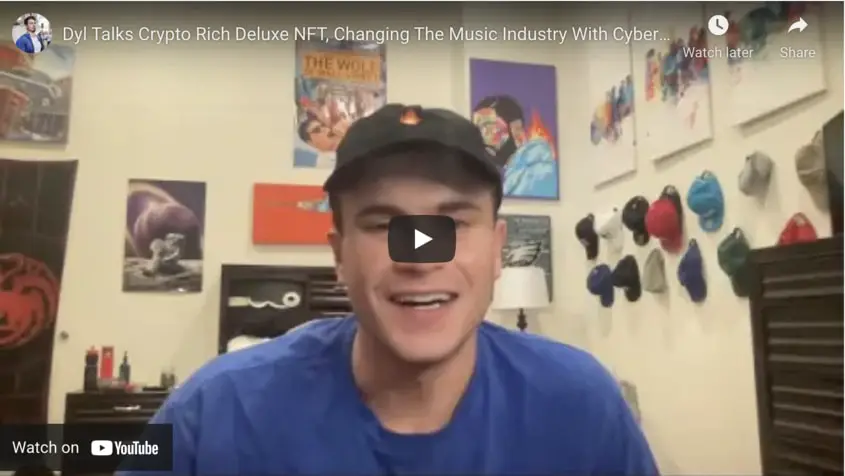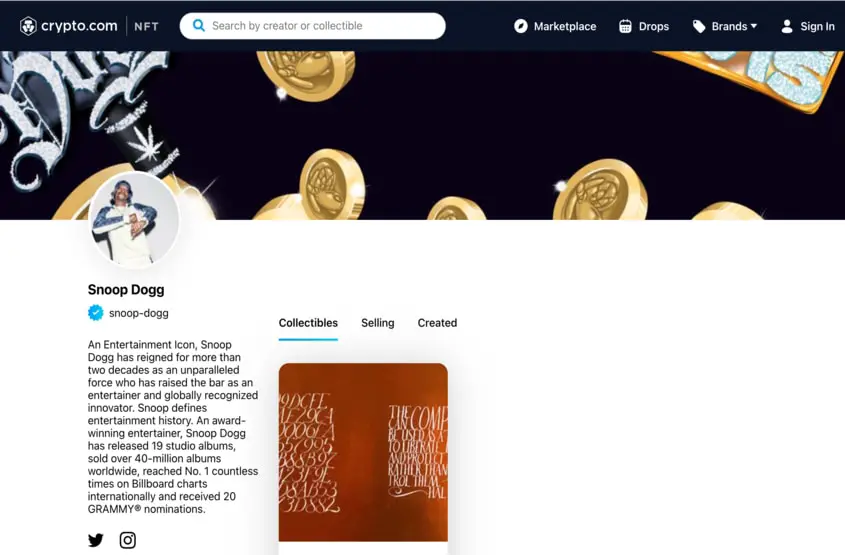Non-fungible tokens are changing the way industries conduct business and connect with their consumers. In the music industry specifically, NFTs are transforming the way artists grow their capital while supplying fans with additional value. I interviewed platinum hit single recording artist Famous Dyl, for an in-depth view into how exactly NFTs are revolutionizing the music industry.
NFTs are revolutionizing the music industry by allowing artists to make their own money without a record label company. Moreover, artists can earn a percentage of every secondary sale by implementing royalties. As well, musicians can provide extra value for fans by creating terms such as; VIP access, meet-n-greets, monthly meetings, merchandise deals, and even fan royalties.
One of the main ways NFTs have changed the music industry is by empowering artists to raise their own capital by cutting out the middle-man (the record label company) and creating their own non-fungible tokens to offer their fans for a fee.
What may be an even greater perk for artists is the ability to earn a percentage of every sale after the initial sale—known as royalty. Artists can choose their preferred percentage (generally 10-20%) which will enable them to earn that specific percentage from every sale, for as long as that NFT exists.
NFTs don’t only benefit the artists, but also the fans. Fans and collectors can enjoy creative perks written into the NFT’s smart contract giving fans additional value such as VIP access, merchandise, meetings, interviews, and even royalties from album sales.
Before non-fungible tokens, many of these things would be near impossible to accomplish. However, thanks to technology such as the blockchain and web 3.0, NFTs are now a staple in the music industry. Watch this in-depth interview I did with Famous Dyl to better understand how NFTs have changed the music industry:

What Are NFTs In The Music Industry?
If you have little experience with non-fungible-tokens, then you may be wondering what exactly NFTs are and how they can be used in the music industry.
NFTs in the music industry are digital assets minted on the blockchain which artists can use to fund their career by selling their own NFTs as an album, concert ticket, collectible, merchandise, and anything else that may create demand and add value for the fans.
NFTs can be minted into a number of common assets found in the music industry, such as:
- An Album
- Concert Ticket
- VIP Pass
- Merchandise Drop
- Collaboration Deal
- Studio Time
- Mentorship
The only limitations to what an artist can mint are solely based on their imagination. Practically anything can be minted into a non-fungible token.
NFTs Are Good For Artists.
There are various opportunities for everyone to benefit from non-fungible tokens. This is especially true for artists and other entertainment performers. So, why is it that NFTs are so good for artists?
NFTs are good for artists because they provide additional value, trust, and transparency between both musicians and fans. All of this opportunity means there’s potential for additional streams of revenue, community building, and access.
In my humble opinion, one of the best things about NFTs in the music industry is being able to be a part of history with your favorite artist. When you purchase a concert ticket in NFT form, for example—that information is forever recorded on the blockchain as proof that you were at that concert on that date.
With that being said, you’re NFT acts as a sort of collectible as well. You can re-sell your digital asset even after the concert has passed and you and the artist can both make a profit. Or, you can hold onto your token for years to come and even pass it down to your children as a cool collectible.
Ultimately, non-fungible tokens are good for artists because they also benefit the consumers. It’s a win-win situation.
Where To Buy NFT Music.

There are various marketplaces where you are able to purchase NFT’s created by musicians. But, it really depends on the artist and where they choose to mint their work.
Here are some common places you are able to purchase music-related NFTs.
| NFT Marketplaces: | Musicians Who Have Sold Their NFTs. |
|---|---|
| Rarible.com | Famous Dyl |
| OpenSea.io | Kings Of Leon |
| NiftyGateway.com | deadmau5, The Weekend |
| Crypto.com | Snoop Dogg |
| BandRoyalty.com | Rihana, will.i.am, Timbaland, Beyonce, Jay-Z, and Justin Timberlake |
Wherever you decide to purchase your favorite artist’s NFT, make sure you are purchasing the authentic NFT minted by that artist. Anyone can mint anything they want, so there are replicas out there that may be confusing when purchasing your own NFT.
Here are a few tips to ensure you are purchasing the real deal NFT:
- Make sure you are shopping the correct marketplace where the artist announced their NFT drop.
- Generally, artists will have ways of authenticating their NFT account such as official site checkmarks and links to their official social media accounts.
- Follow your favorite artists on social media in order to stay up-to-date on their most recent drops.
NFT Music Copyright.
One of the most common questions I have seen surrounding music and the offering of NFTs is your rights as a token holder. Do you actually own the song and the copyright to that song? Are you able to use the song in any way you’d like, it really depends.
Unless otherwise noted in an NFT’s smart contract, all copyright, intellectual property, and permissions are owned by the creator and are strictly at the creators’ own discretion. As a token holder, you own the NFT itself and its associated metadata.
This doesn’t mean that there isn’t an opportunity to own a piece of an artist’s work, however. Marketplaces such as BandRoyalty.com, allow you to stake in BAND NFTs, in order to access revenues from the music royalties BAND acquires. This is just an example of how you are able to invest in a musician and your favorite music.
If you want some more information regarding NFTs and your rights, make sure to read this article: Your Rights As An NFT Holder Explained.
Taking all of this into consideration, it’s apparent non-fungible tokens are here to stay and are forever changing the music industry as we know it. NFTs provide more value and opportunity for both the artist and fans alike. We will see stronger communities being built within the music industry, only furthering the connection between an artist and their beloved fans.

4 thoughts on “How NFTs Are Changing The Music Industry”
Comments are closed.